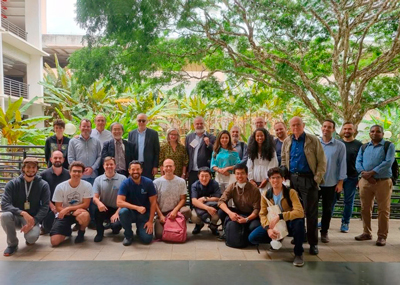With the theme "Intelligence and Artificial Intelligence," ICA 4 has brought together researchers from different countries
 |
|---|
| ICA 4 participants in Belo Horizonte |
In November, the second phase of the fourth edition of the Intercontinental Academia (ICA) took place in Belo Horizonte.
The ICA is an initiative of the international network of University-Based Institutes for Advanced Study (UBIAS). Each edition is organized by two IASs from different continents. In the case of ICA 4, which has explored key interdisciplinary issues at the intersection of cognitive science, neuroscience, and artificial intelligence (AI), the hosts have been the Paris Institute for Advanced Study, a member of the French Network of Institutes for Advanced Study (RFIEA), and the Institute of Advanced Transdisciplinary Studies (IEAT) of the Federal University of Minas Gerais (UFMG).
Two of the Brazilian participants are professors at USP: André Fujita, from the Institute of Mathematics and Statistics (IME), who has been appointed by the IEA, and specialist in health technology assessment Patricia Coelho de Soárez, from the Medical School (FM), which has supported her. The third Brazilian is Evandro Cunha, a professor of computational linguistics at UFMG.
For Fujita, the term that best describes the experiences promoted by the encounters is "fantastic." They have allowed various exchanges among the 19 participating researchers and the fellows, collaborations with other institutions, and contact with mentors - including Nobel Prize laureates and directors of renowned centers - who have provided inspiration to everyone. "This has allowed thinking 'outside the box' and setting up a collaboration with fellow Laura Candiotto, a philosopher specializing in emotions," he points out.
Specialized in bioinformatics, Fujita works with the interaction between biological components and the way they create specific phenotypes, working with statistical methods to analyze biological data on a large scale. His contribution to ICA 4 has focused on his experience with biological network analysis, as well as the interdisciplinarity of his field.
Related material |
|---|
| News: |
While the meeting in Paris has been split into eight days of seminars, activities in Belo Horizonte have prioritized the work among the researchers, with parallel meetings with mentors, and guests from academia and the productive sector.
For Fujita, two outstanding events have been the visit to the local neuroscience and robotics laboratories, as well as a meeting with Virgílio Almeida, when he addressed the Center of Artificial Intelligence in Health. Almeida is professor emeritus from the Department of Computer Science at UFMG and current holder of the Oscar Sala Chair at the IEA. "The meeting with Professor Almeida has been a gateway to collaborations with UFMG's computer science and health personnel," Fujita states.
In addition to the Belo Horizonte stage of ICA 4, Fujita also participated in the first one, which took place in October 2021 in Paris, and in an intermediate meeting in Nagoya, held from August 31 to September 2, 2022, having robotics and artificial intelligence as main themes. On the latter occasion, he presented a seminar at the Nagoya University Graduate School of Medicine. Topics from the work of the ICA participants and professors who work with robotics at the institution were discussed. According to the researcher, the discussions were centered on how human-looking robots would fit into society besides robots that help humans in everyday activities. For him, one of the main impacts of his visit was the meeting with Toshio Fukuda, president of the Institute of Electrical and Electronics Engineers (IEEE) in Japan. Amongst criticisms and suggestions, the emeritus professor from Nagoya University offered a paid travel for Fujita to spend a few months working with his robotics group.
The first edition of ICA was held in 2015 in São Paulo, at the IEA, and in 2016 at Nagoya University's Institute for Advanced Research, having "Time" as the theme. In 2016, "Human Dignity" was the theme of the second edition, which took place in Jerusalem, Bielefeld (both main hosts cities), and Johannesburg (where an additional meeting took place). Between 2018 and 2019, the third edition addressed "Laws: Rigidity and Dynamics." Institutes in Singapore and Birmingham were the hosting partners.
Photo: courtesy of André Fujita
